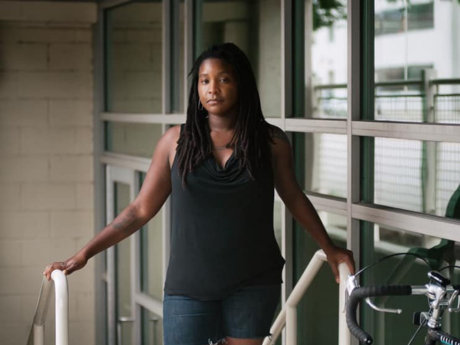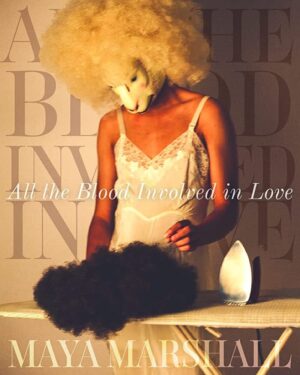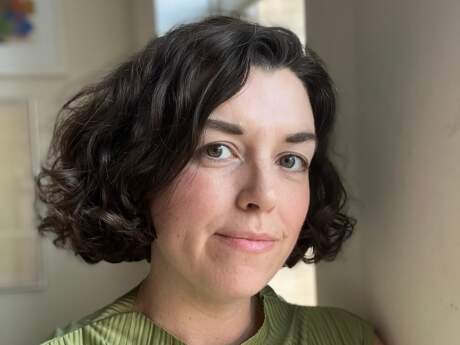In Their Own Words
Maya Marshall on “For Dawn Wooten”

For Dawn Wooten
I have the good fortune to be free.
To choose.
To have part of my cervix intact,
to change the locks after
I’m attacked.
Somebody offered me a karate class.
I could still (with a little more
of the luck I’ve already enjoyed)
say yes to a man,
to a little sugar.
Nobody has a life without a woman’s blood.
I could still go under and come out whole
enough to make
another whole life—
a child to place against my mother’s bosom—a greatest gift.
Oh, to be free
enough to pick apart a rapist
man-in-charge, or
a god-doctor
with some script for all the reasons
he knows life is his enough to give
or take
like a kiss, or a breath.
Like a wave: to drown, uncover, or cover up.
Reprinted from All the Blood Involved in Love (Haymarket Books, 2022). All rights reserved.
On “For Dawn Wooten”
My book, All the Blood Involved in Love, orbits around the question: Why don’t you parent a little? In its most basic sense, the book is predicated on the right to and the ability to choose. It was written with an attention to threats to those freedoms. And it was published on the day the United States Supreme Court overturned Roe v. Wade.
I wrote "For Dawn Wooten" to reflect on and reckon with still rampant governmental abuses and on how much luck plays into freedom and safety. This is a kind of “there but for the grace of god go I” kind of poem. Dawn Wooten did the right thing and I wanted to acknowledge that I see her trying to protect people from the crimes of patronizing, abusive systems.
Dawn Wooten
blew the whistle about forced hysterectomies in United States detention centers. Violations like these evince a continued assault on poor women of color. The forced sterilization of women detained by border patrol echoes the forced sterilization of Black women like Fannie Lou Hammer. It is a recent example of a long-term systematic misogynistic assault on the bodily autonomy of child-bearing people.
In the world of this poem, the speaker has been violated by an intruder to her home; separately she undergoes a necessary and reparative medical intrusion into her body. As I was writing I needed to reconcile my privilege and my awareness that most people are vulnerable to being patronized by medical professionals, especially in medical facilities in carceral facilities with my understanding that I have the freedom to influence my medical care. I have the freedom to attempt IVF. I had, at the time, the freedom to get an abortion anywhere in my country. The abuse of the detained women and children concretized for me the continued nonexistence of those freedoms for so many in this country. It made me furious and it made me sad. So, I responded.
Each element in this lyric poem constellates around a question at the nexus of choice, bodily autonomy, and responsibility. I’m borrowing Gregory Orr’s definition of the lyric here. For Orr, the lyric “constellates
around a single center—usually an emotional center such as a single dominant feeling . . .image, action, or situation. . . . [T]he shape of a lyric is that of a snowflake or crystal—an intense, almost geometric concentration around a center.” (p. 82, from “Lyric and Narrative” in A Primer for Poets and Readers of Poetry)
My hope is that when readers hear the speaker she dramatizes the larger concern of a person’s right to reproductive justice—the right to maintain personal bodily autonomy, have children, not have children, and parent the children we have in safe and sustainable communities (Sister Song).
We’re in a moment when the crimes of our government and the moral failures of our systems are both seen and ignored. Writing is a way to raise awareness. Awareness should lead to action. For Dawn Wooten, it did. For me it led to writing, which is too a form of action.
The speaker in my poem values being able to choose who enters her body, what exits it. She knows that systems outside of her, people outside of her take liberties and seek to make those choices for her. She knows people in power take advantage and she wants to fight. She knows the power should belong to The People but that often the lives and preferences of the most vulnerable suffer the choice of those in power to “drown, uncover, or cover up” what they do to the poor.
Author photo by Michael Dantzler



